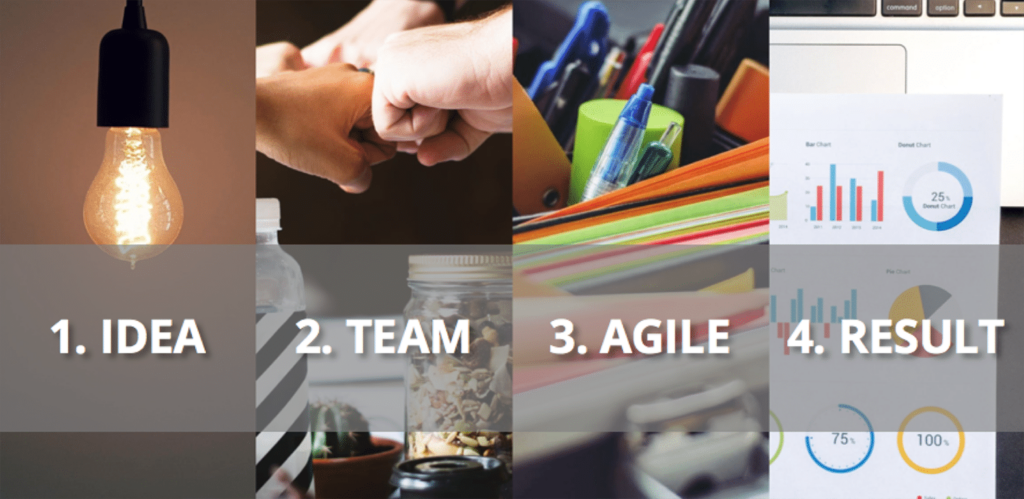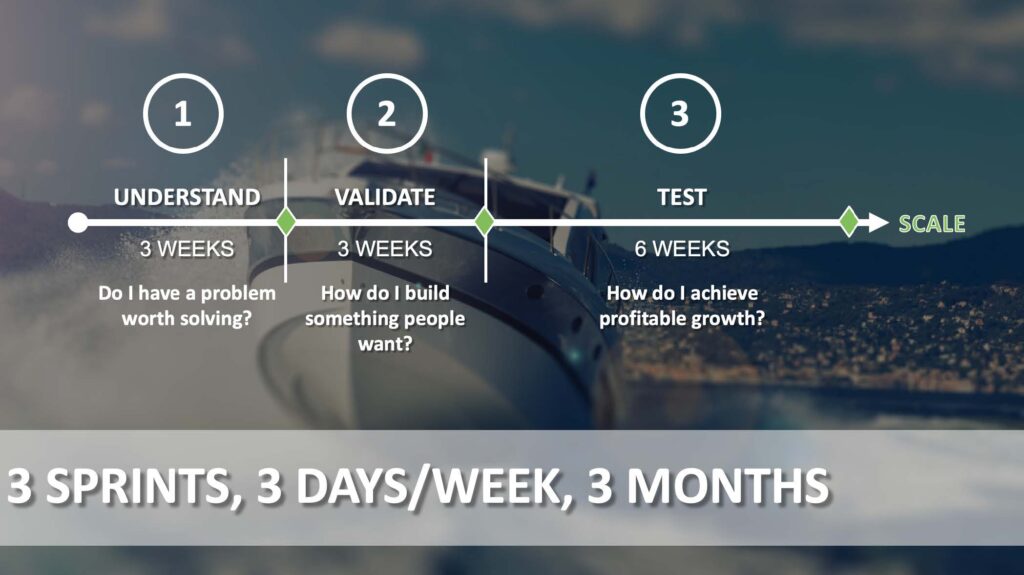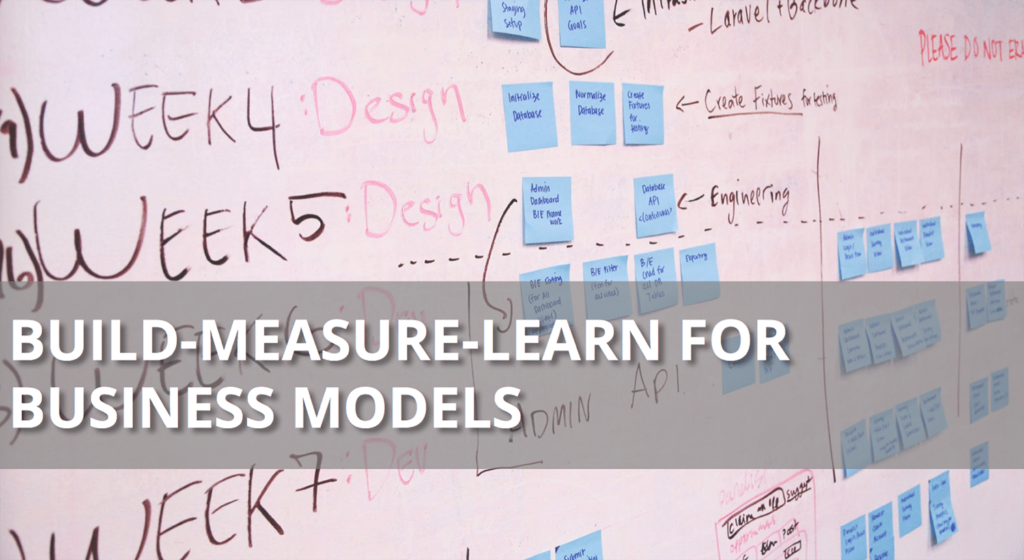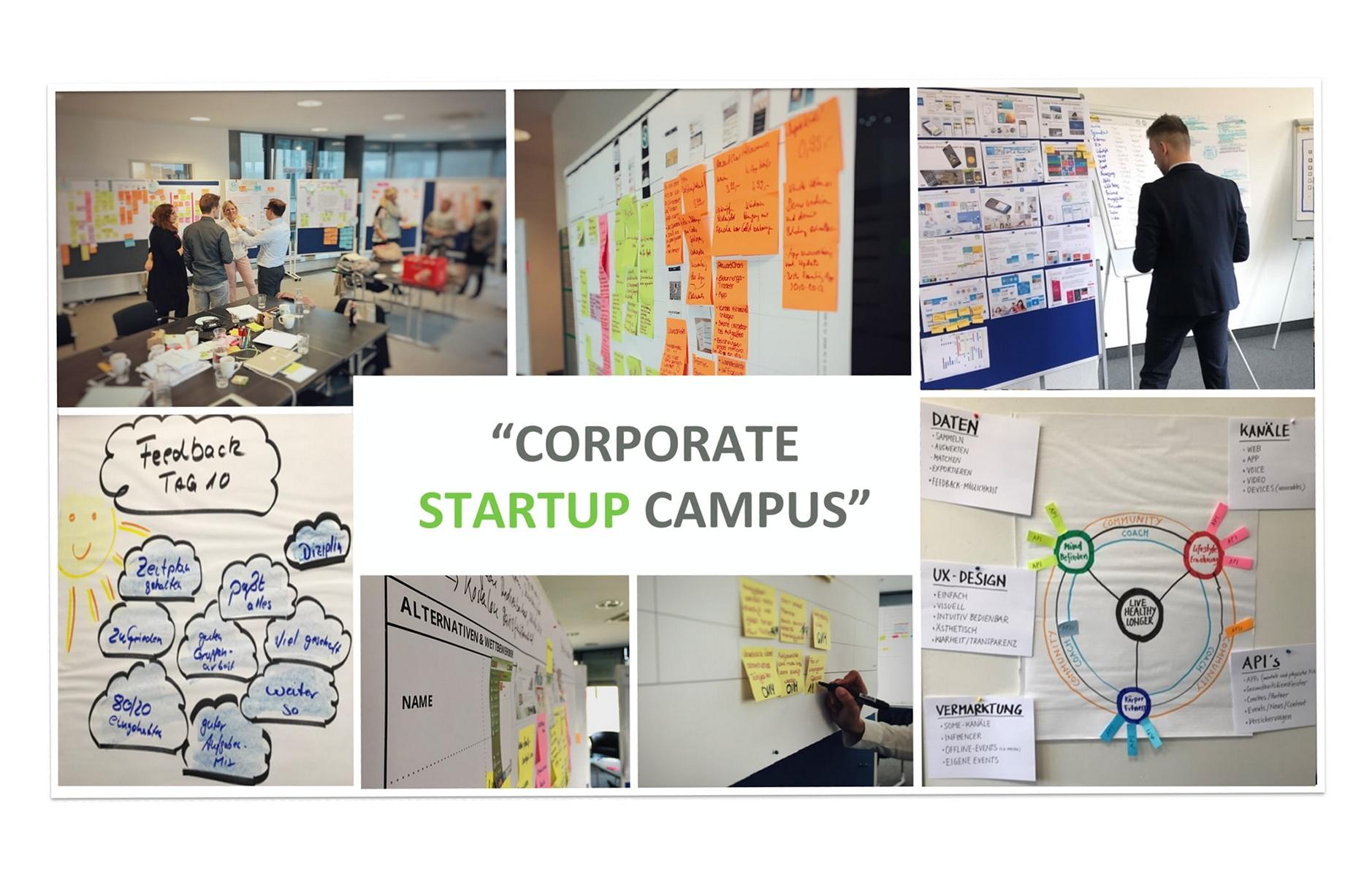The effective way of business building
Over the past years, every corporate decision maker witnessed technological change based on a single mega trend: Digitalization. While digitalization is still far from being fully mastered, other mega trends are already on the horizon which will change, disrupt or eradicate businesses completely. Kodak’s failure to react to advancements in digital photography and its subsequent decline serves as a warning example to most managers. Nowadays, more and more C-Level executives are aware of this danger and know that innovation is key for sustainable success. As a result, corporates are juggling numerous innovation initiatives however, too few deliver measurable results.
Lacking focus and business relevance, these projects create distraction and hinder execution of the most promising business opportunities. Major technologic breakthroughs will enable rapid enhancements in AI, VR, IoT, E-mobility and Blockchain (to name a few). Combined with socio-economic trends like urbanization, connectivity and personalization, new business models will surface and radically change the competitive landscape of current players. For example, online retail giant Amazon is on its way to become one of the most influential TV show and movie producer and Uber & Lyft changed the way we use public transportation in most markets they are in. It is obviously not a coincidence that the most disruptive technologies are brought up by start-ups, which makes it even more important for corporates to stay at the forefoot of action when it comes to innovation. The current mantra must be “innovate or die”, which is not exaggerated, given that 75% of the current fortune 500 companies are likely to be replaced by 2027 (as per Innosight, Richard N. Forster, see here).
At Excubate, we have developed a result and business driven program to tackle this task together with our corporate partners, which brings together the best of the startup and corporate worlds, enabling our corporate clients to stay ahead of the innovation race: The Corporate Startup Campus.
Bringing an innovative business model to life – in 12 weeks
We believe in the successful combination of corporate capabilities (like know-how, experience and sufficient resources) and startup capabilities (like creativity, methodology and pragmatism). The Corporate Startup Campus is designed to meet the corporate’s need for structure and process without losing the flexibility and speed of a small team with a shared mission. At the core of the whole program is a highly efficient, cross-functional team which combines not only all necessary business functions but also all relevant project responsibilities and ownership. Through state of the art innovation management and agile methodologies brought in by an Excubate Hybrid Coach (see here) the Corporate Startup Campus team is fully equipped to move at high speed and maximum efficiency. The combination of entrepreneurial, corporate and consulting experience, deep methodological know-how and a creative mindset, enables the hybrid coach to act as a catalyst for innovation. Our program involves 4-6 corporate employees who will work collaboratively for 3 days a week for 12 weeks in a row and is complemented by external people (e.g. an experienced developer) as needed, in case the required skillsets are not available internally. As a result, we typically produce a validated and “ready to scale” (digital) business model or product. Such projects can act as a lighthouse for internal cultural change towards a more agile and innovative organization. By adapting the campus framework slightly, it is also possible to use the process for efficiency projects such as internal digitalization or optimization, too. Finally, the Corporate Startup Campus serves as knowledge transfer vehicle regarding innovation management and agile methods for the participants of the program.
Four cornerstones of a successful Corporate Startup Campus
The Excubate Corporate Startup Campus is a 12-week structured program, aiming to develop a ready-to-scale, proven business model. It can be applied to matured ideas that are still vague in terms of customer value, scope and business case as well as very early on in the process where the idea still needs to be shaped. We identified four major factors which enable corporate innovation approaches like the Corporate Startup Campus. In the following we will take a closer look at the right starting point, an effective team setup, the appropriate working mode and methods as well as the importance of a results-driven approach.

1. Start off with an established idea or conduct structured ideation workshops
Obviously, the starting point is crucial as it defines the extent and methodologies for a corporate innovation program. In some cases, our partners approach us with an existing idea to be transformed into a viable business model. Other companies have a working idea management framework, which makes it usually possible to identify the most promising ideas without too much effort. Strategic fit, size of the market opportunity & grade of innovation are factors which can determine whether an idea is worth to be proceeded through a Corporate Startup Campus or not. In organizations in which creative and innovative ideas are not managed consistently, we typically start by conducting ideation workshops.
During those highly-structured, outcome oriented working sessions, we help to work out and prioritize business ideas to provide the right starting point for a corporate innovation project. The underlying assessment framework includes company specific items like strategy and portfolio fit as well as external, market defining factors like technology drivers, behavioral trends and market environment. To ensure that the development of a viable new business opportunity is possible within 12 weeks, each idea must meet three entry criteria: Sufficient idea maturity and focus, limited dependencies to other projects and relevant business impact.
2. Bring in a highly motivated, cross-functional team
Startup Campus success is – like any startup success – highly dependent on the team. More than in line activities, Corporate Startup Campus teams will have to take on increased responsibility and ownership for their field of expertise. As this happens at a high pace, not everyone feels comfortable working this way. Typically, about 5-15% of employees in big organizations possess an entrepreneurial passion and respective capabilities, therefore a thorough, selective team recruitment is important. Thereby the focus is on finding the best fitting and most motivated people, not on finding employees who have free capacities. Although internal recruitment is challenging due to e.g. line responsibilities, it will come with upsides. The internal team will bring in deep industry knowledge and a well-established network with support functions which will help to gain speed easily. Furthermore, the project will demonstrate that “innovation from inside” is possible and desired which leads to higher internal credibility of innovation efforts. Candidates should be comfortable acting in uncertainty, taking ownership and risk, have creative minds and should be hands-on. To ensure project success, we will assist and guide our clients to find the best internal team possible.
The best performing teams find an effective way of working despite or maybe because of their opposing personalities. To enable empathy for each other, the Myers-Briggs-Type-Indicator has proven to be an effective tool. By understanding and addressing differences in personal and professional traits, teamwork gets smoother and more pragmatic. It also helps the hybrid coach find the right way to solve conflicts which will inevitably occur. The campus team should also bring all major capabilities (Sales, Marketing, Development, Finance, …) to cover all roles a startup typically has to cover (CFO, CIO, …). In case of insufficient internal team staffing, Excubate can fill in additional team members in an interim management role if needed. Additionally, external experts (e.g. Design, Growth Hacking, Legal…) will be pulled in to ensure high quality results. The Corporate Startup Campus will expand the team’s skills and capabilities which makes it a perfect opportunity for high potential employees and their professional career development plan, thus, also a great HR tool. Practicing decision making, delegation and hands-on mentality while being guided by an experienced hybrid coach will have a positive effect on the development of high potential employees.
3. Use agile methods as pragmatic enablers, not as paradigms
To deliver a viable business model in 12 weeks, the campus team makes use of a proven working mode that is mainly defined by agile and startup methods, team focus and sponsor involvement.
Following one of the most basic concepts of Scrum, we work in 3 sprints, focused on different development stages of the new business. In a nutshell, we understand the customer and market first, validate our ideas second and develop/test the real product at last.

To ensure customer centricity, we work with a wide range of agile tools and templates like personas, the value proposition canvas or customer journeys. Customer interviews and surveys help validate or falsify our idea related hypotheses. Having agile principles at the core of the campus program, learning is key throughout the whole process. Interviews, preto- and prototypes, fake door tests and MVP (Minimum Viable Product) tests help to gain insights into potential customer segments. This way the team is able to refine the product idea and the business model constantly.
During the program, the team meets during 3 subsequent days per week with full focus on the project. Unrelated meetings, calls or all other usual disturbances must be shifted to the remaining two days of the week. To avoid disturbance, it usually makes sense to choose an offsite location, which offers enough space for creative work and is sufficiently far from the everyday office location.
During the sprint reviews, the team shows current findings, asks for sponsor guidance proactively and obtains approval for further steps that they cannot decide themselves. It is important that the group of sponsors (typically a small group of senior management) embraces the agile working mode. This means holding off on giving the typical (micro-) management style guidance and showing trust in the team’s entrepreneurial decisions. Subsequently, the team will continue to tackle challenges at high speed and autonomy during the following sprints. However, despite working agile, a new business model won’t come to life just by sticking to a Scrum textbook. Therefore, the hybrid coach constantly sets next steps based on the projects’ advancements individually, applying pragmatism and business sense.
4. Focus on results, not on “output”
- The Corporate Startup Campus aims to create viable business models. Unlike other innovation programs, which sometimes stop at theoretical business concepts printed and paperwork, we focus on three deliverables: The actual creation of a new and sustainable business model (ideally culminating in a new legal entity), a Minimum Viable Product (MVP) and a proof of concept. This sometimes even entails a first set of willing-to-pay customers within the 12th campus week, which makes it easy to convince the sponsors of the business models potential during the final review.In an agile world, “results eat words”. This principle serves as our guiding light in almost every situation during a campus project. Consequently, after coming up with new ideas, the next step is finding ways to prove the ideas’ validity. This important lesson is one of the first lessons learned during each campus, as an interview with a potential customer always brings enlightenment regarding a potential product or business model. In general, the first idea will be pivoted multiple times until it fits with customer needs.

The abovementioned agile testing options are the basis for data and results-driven decision making. These high paced decision cycles are antithetic to the corporate approach with rather indolent decision making, based on overanalyzing for the desire of certainty. Thus, the campus team needs to stop thinking in a corporate way and embrace a results-focused, startup-like mind-set to succeed. Higher autonomy towards decision making comes with greater responsibility. The team needs to ensure – guided by the hybrid coach – that they reach the projects` key deliverables.
Our job doesn’t stop there
Towards the end of each Corporate Startup Campus, similar questions arise among the sponsors and team members. Follow-on options, future team staffing, preservation of the newly acquired innovative culture and skills and the transition of the Corporate Startup Campus into a repeatable model are topics we discuss after a campus project with the respective stakeholders.
Corporates need to prepare for the scaling phase after the campus program. To ensure that campus’ efforts and results aren’t lost, we will give guidance on pros and cons of various follow-on options. Depending on strategic focus, integration into an existing business unit, creation of a new business unit or formation of an independent spin-off are options to consider.
For the business to succeed, it is vital to have complete management commitment early on, including the assignment and incentivation of a future business owner and follow-on team staffing. Including key campus members in the scaling process is crucial to avoid hand-over and knowledge setback. Leveraging our experience in setting up corporate innovation environments, we provide clear guidance on how to proceed in the most effective way.
Additionally, the management could use the campus results as a proof point for cultural change and the corporate’s innovation potential. Active and open communication (e.g. open-door session for all employees or all-hand presentations and/or continuous coverage through blog articles) throughout and after the Corporate Startup Campus helps to trigger and maintain a new, innovative culture.
A sustainable shift in company culture will be reached by not only running the campus once, but conducting subsequent campus projects, making it a common way to innovate for all business units. The Excubate approach supports this shift with a train-the-trainer program, in which a dedicated employee (the future campus coach) takes part as a campus team member at first, acts as co-coach during a second campus and gets expert support during a third self-managed campus. All following campus projects can be then led by the new, internal hybrid coach.
For Excubate, the Corporate Startup Campus means creating sustainable business models and moving towards a truly innovative and results-oriented company culture. Rather than investing in projects that will not make it to market or fail late at high costs, corporates should leverage their employees’ innovation potential and dedication in a thought-through process. As this is far from being easy, our experts guide the team to reach innovation excellence. Fast paced business model innovation is a topic for your corporate? We’d be delighted to start a conversation with you: innovate@excubate.de
